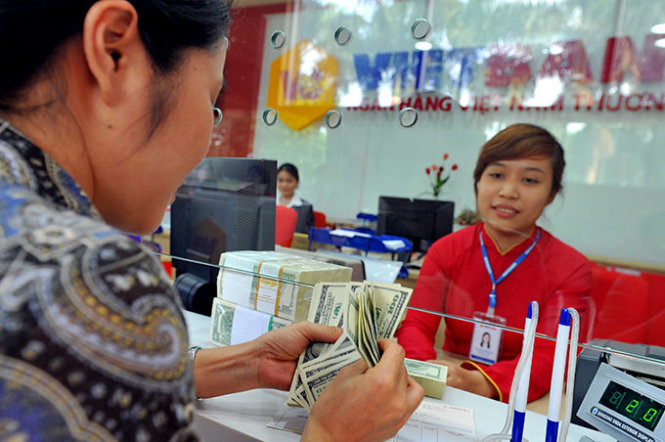The rise in value of the U.S. dollar against the Vietnamese dong, which took effect earlier this month, has made some Vietnamese people quite happy, but disappointed many others.
The State Bank of Vietnam, the central bank of the Southeast Asian country, on May 7 allowed the local currency to lose another one percent against the greenback, after devaluing it by one percent in January.
The bank has promised that it will not depreciate the local currency by over two percent against the dollar this year in order to stabilize the macro-economy.
While local exporters, who are said to be the main beneficiaries of the latest devaluation, told Tuoi Tre (Youth) newspaper the benefits they have received are negligible, those firms that have to import materials for production said they face many hurdles with the appreciated greenback.
Some agricultural exporters said they would make more money because of the dollar price increase, but many importers are concerned about additional costs, as they have to spend more Vietnamese dong to buy dollars to import goods and pay their dollar-denominated debts.
Exports of agro- and aquaculture products are among Vietnam’s leading cash earners, with US$25.7 billion last year, making up over 17 percent of the country’s total export revenue.
The flip side
The export of aquaculture products, which suffered the most when the dollar appreciated against many other currencies in the first quarter of this year, seems to have begun making back what they lost during the period.
In the first quarter of 2015, seafood exports reached $1.65 billion, down 17.4 percent from the same period of 2014.
Shrimp shipments in particular were the biggest loser, at $574 million, down 28 percent from the same period last year, according to the Vietnam Association of Seafood Exporters and Processors.
Exports to the three largest markets, including the U.S., Japan, and the EU, dropped by 56 percent, 28 percent and three percent, respectively, mainly due to the fact that the dollar has risen strongly against the euro and Japanese yen, which caused seafood prices for export to those markets to increase.
Le Van Quang, general director of Minh Phu Seafood Corp, said that in just over one year the greenback appreciated by 20 percent against the Japanese yen, Australian dollar and euro, thus making Vietnamese shrimp exported to the U.S. more expensive.
Meanwhile, many other rivals, such as China, India, Thailand, Indonesia, and Ecuador have devalued their currencies, making the prices of their shrimp more competitive when exporting to the U.S.
The exchange rate adjustment of one percent is negligible and the competitiveness of Vietnamese goods has not improved much, he complained.
However, many exporters said they were badly affected by the rate adjustment.
Tran Viet Anh, general director of Nam Thai Son company, said that the firm does not benefit from the exchange rate adjustment, as it received euros when exporting goods, while they have to pay in U.S. dollars for the importation of raw materials.
With demand from $1.2 to $1.5 million a month for payments to the bank, the new rate will cost the company an additional VND258-322 million ($11,900-14,860) per month to produce goods for which all the materials are imported.
Nguyen Chi Trung, director of Gia Dinh Shoes company, said the firm has targeted to earn $48 million from shipping four million pairs of shoes in 2015.
“Although our goods are for export, we have to buy materials from foreign partners and pay in U.S. dollars, so the benefit of the rate adjustment is tiny,” he said.
Which currency to hold?
Van, a woman from Binh Thanh District, Ho Chi Minh City, said she has a VND200 million ($9,230) three-month term deposit with an interest rate of 4.6 percent per year.
"But the exchange rate has increased by two percent, plus 0.75 percent of the current interest rate of deposits in U.S. dollars, the real interest for greenback holders now is 2.75 percent, while for Vietnamese dong holders like me, the current rate, minus inflation, will be very small by the end of this year,” she said.
Economist Huynh Buu Son said that people should consider various factors to decide whether to keep the local currency or the greenback.
Many people worry that the dollar will rise in value against the dong again before the end of the year.
“But in my opinion, in the last months many favorable factors can appear for exchange rates to remain stable, such as increased export revenue and the rising inflow of overseas remittances,” Son said.
On the other hand, exchange rate stability is the most important goal set by the central bank, so it will try to achieve the goal by the end of the year, he added.
“Therefore, the possibility that the exchange rate will be hiked again is small, and if any changes are made they will not be significant,” Son said.
The economist added that given low inflation, which was at 0.8 percent in the first four months of this year, keeping dong would be more profitable.
The general director of a joint stock bank also shared similar thoughts, as exchange rate rises will put pressure on interest rates, thus increasing the operational cost for local firms, which the state does not want to do.
If there are moderate savings, the best choice for people is to deposit to earn high interest, he said, noting that if their savings are big, customers can choose many investment channels to diversify profits and risks.
Like us on Facebook or follow us on Twitter to get the latest news about Vietnam!


















































